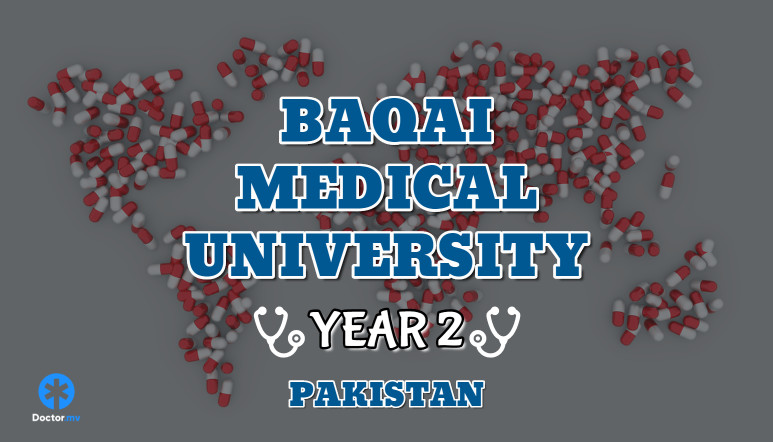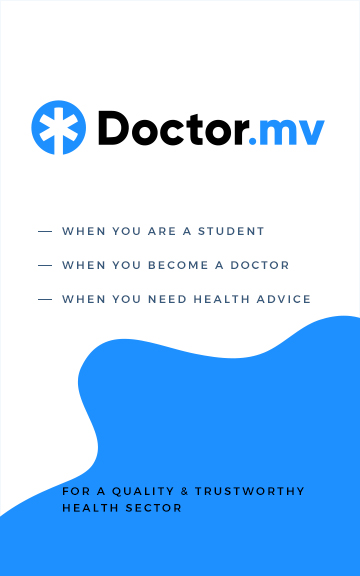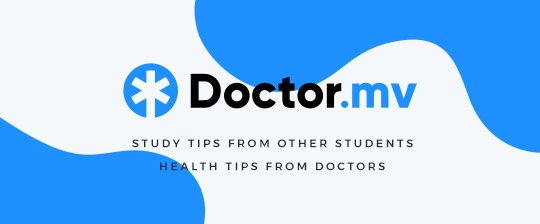I'm ANAS JALEEL and this is My Medical Student Life

University
Baqai Medical University
Current Year
Second
Medical Specialty Interested in
Sports Medicine
Most Inspiring Person
My Dad
Single Quality that defines a great Doctor
Knowledge
First of all, walk us through the step-by-step processes that you went through to get to where you are today?
I completed both O'Levels and A'Levels in Faafu Atoll Education Centre. I even gave tuition to students during my 6-month break after my O'Levels. Afterwards in 2016, I moved to Male' and started working at Stelco to earn some money before I move abroad.
My uncle is a Cardiologist currently working in the Maldives. Under his guidance I first applied for the student loan to study in Malaysia. While I was waiting for an answer, I found a scholarship opportunity to study Medicine in Pakistan. It was announced in the Department of Higher Education (DHE) website. After discussing with my uncle, I applied for the scholarship as well.
I got nominated for both the student loan to Malaysia and the scholarship to Pakistan. Hence, I had to make a choice between the two. I wanted to make the right decision so I referred to my uncle again. He told me that the clinical practice in Pakistan would be better compared to a more developed country such as Malaysia. Patients would be more allowing to be treated by a Medical student and the diseases would be similar to the Maldives. Moreover, there are a lot of successful doctors in the Maldives that graduated from Baqai Medical University.
When did you first realize you wanted to study medicine?
Ever since I chose Science stream in school, I started gaining interest in Medicine. I always wanted to contribute to the community and one of the ways to do it, is by becoming a doctor. I also have two doctors in my family and I get inspired by them every day to pursue Medicine.
Take us through a typical study day.
I wake up at 5:30 am to perform my prayers and to study 30 minutes before preparing breakfast. The short, distraction-free time I spend to study is very important to me. I review everything I learned the day before so that they are in my mind when I go for my lesson. I leave with my friends at 8 am and reach in time for classes to start at 8:30 am. Classes normally end at 2:30 pm, but if we have some work left to complete, we finish latest by 3:30 pm.
I take a 1-hour nap as soon as I reach home. Afterwards, I go through the day's notes for 30 minutes before starting to study. I follow the Pomodoro technique to study - 25 minutes of intense studying followed by a 5 minute break, and after 4 cycles I take a 30 minute break. I end my studying by 11:30 pm and go to sleep afterwards.
How do you stay motivated to study?
At a time when I don't feel like studying, I remind myself that at the end of the day I have to study that topic for my final exams. And if I don't study it now, everything will pile up and I have to face the consequences.
I'm spending a lot of money and time to come here to follow my dreams, and I can't afford to let it go to waste. Reminding myself helps me stay motivated.
What are some of your favorite online resources/tools?
If I don't understand something from the textbook, I refer to YouTube for easy understanding. In my university, if we look at the technological development, they still use old equipment and methods to teach students. Hence, we are advised by our teachers to study from textbooks.
I loved learning from Dr. Najeeb's videos and they helped me understand the topics very well during my First year. However, when I talked to the Head of Department for Physiology in my university, he told me that he does not recommend learning from the videos. One time, I faced a problem when I learned how to read ECG from a 3-hour video by Dr. Najeeb. When I explained it in class, my teacher did not approve and I had to learn my teacher's method to get marks in the exam.
After this experience, I only study from the recommended textbooks by the university, and go on YouTube rarely.
Name your favorite medical text book.
Guyton & Hall Textbook of Medical Physiology.
Why do you think becoming a doctor is important?
It is contribute to the community by doing good work. I believe that becoming a doctor elevates your position in the society and gain the respect of many. I've seen my uncle after treating patients, getting a flood of messages thanking him for his work and wishing him the best of luck in the future.
What do you know now that you wish you knew when you first started medical school?
I wish I knew all the important areas in the topic, so that I would know what to focus on for the exam. I now realize that when I first started, I spent a lot of time studying irrelevant areas. If I had given that time to the important areas, I would have done so much better in my exams.
For example, in the first module we had a small portion of Physiology and Biochemistry, but a large portion of Anatomy. However, I spent most of time on Physiology, because I had a lot of interest in it. When it came to my Anatomy exam, I lacked a lot of necessary information.
What do you think needs to change in the health industry of the Maldives today?
In my opinion, political influence should be completely removed from the Health industry of the Maldives. In the islands, the government appoints people that are not qualified as heads of a hospital. The person is usually an activist for the political party and has no knowledge on the health field. Working under him, however, are professionals in the health sector. As a result, these people get demotivated and lose interest in the job, especially doctors that come from other countries. In addition, after serving patients the whole day, they are forced to go to meetings and gatherings held by the political party. I've seen this happen in my own island as well as in the neighboring islands.
Secondly, there are people that take advantage of Aasandha in the wrong way. Aasandha is a universal health insurance scheme that should be given to those that actually need it. However, in many cases we see Aasandha given through political influence. If a patient has a political figure in their family, sometimes we see that they are easily able to get treatment in capital Male' or abroad through Aasandha. Yet the doctors state that treatment is available in the local hospital. Because of this the patient that actually needs treatment do not get Aasandha.
After the recent election, the Finance Minister has stated that Aasandha is not sustainable. And that this scheme is currently run on debt. I believe that this is because of the people taking advantage of this system in the wrong way.
Thirdly, many deaths in the Maldives occur due to chronic diseases such as diabetes, heart diseases, liver diseases and cancer. To reduce the number of deaths, the government needs to conduct more awareness programs. Recently, in the news I read that one island in either Haa Alif or Haa Dhaalu atoll that had 6 cancer deaths last year. Right now, there are 14 people diagnosed in that island as well. One of the most important things to do should be studies and research in that island on why so many people are affected. However, the island council has confirmed that one had not been done yet. An action needs to be taken by the government on a broader scale.
Finally, what is the one tip/advice you want to give to our readers?
Avoid procrastination. A Medical student cannot afford to lie on bed and do nothing. Make sure you make use of the time you get everyday. I'm not asking you to spend 24 hours everyday studying. Even when you're not studying, do something that help you become a better person.
Studies should always come first and most of your time should be spent on learning.
The My Medical Student Life series was created for the sole purpose of helping medical students and aspiring doctors on their journey to become a successful Maldivian Healthcare Professional. Have a suggestion, idea or question? Email us.



Leave a comment
0 Comments